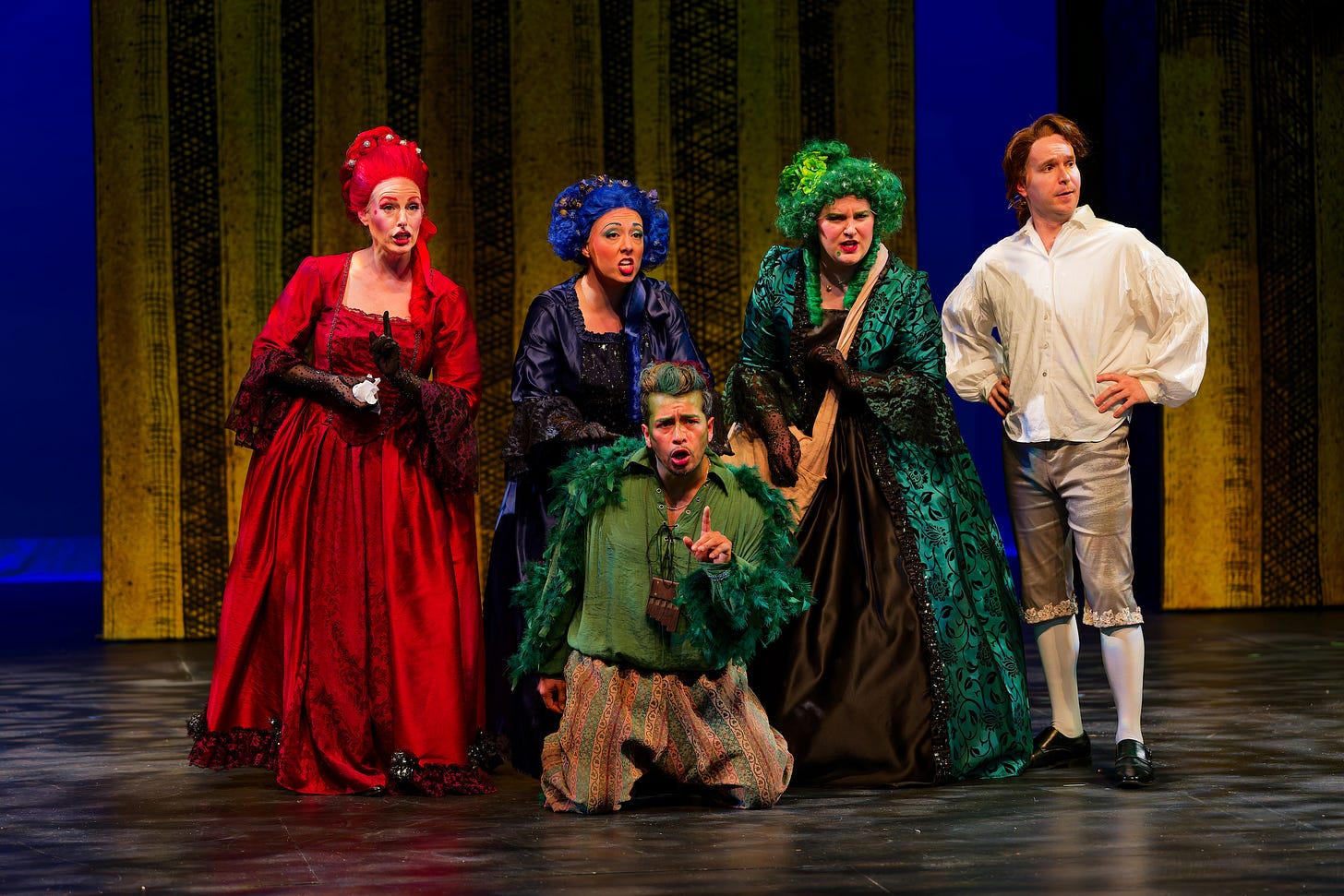Through March 2: Winter Opera Plays it Straight with Die Zauberflöte
Director John Stephens decides not to mess with a classic opera.
John Stephens, the Stage Director of Winter Opera’s production of Mozart’s Die Zauberflöte (The Magic Flute) at the Kirkwood Performing Arts Center this weekend has made a rather bold choice is his approach to familiar piece. He has decided not to mess with it.
I know, I know: this is totally beyond the pale for contemporary productions of established classics, where the norm is to mess with the original as much as possible. To pick just a few examples from my WTF list: put the cast of Les pêcheurs de perles (The Pearl Fishers) in diving outfits, drop Rigoletto into 1950s Las Vegas, set Cosi fan tutte in London during the Blitz, and move Tannhäuser to a Balkan refugee camp. Oy.

Stephens plays it straight and while this production (based on the dress rehearsal I saw) could use faster pacing and more brisk tempos, it’s still quite a respectable presentation of one of Mozart’s last works for the stage and refreshingly free of distracting bells and whistles.
Written towards the end of the composer's sadly brief life (Mozart had only a few months to live when it premiered in September of 1791), Die Zauberflöte is a singspiel—the 18th century equivalent of a present-day musical—set in a mythical land of monsters and magic. The protagonists are Prince Tamino and Princess Pamina, who find themselves and the less-than-heroic bird catcher Papageno caught up in a war between The Queen of the Night, Pamina’s mother, and Sarastro, High Priest of the Sun.
The Queen and her three Ladies con the young prince into believing Sarastro is an evil wizard from whom Pamina must be rescued. Arming Tamino with the titular flute and Papageno with a set of magic bells, they summon a trio of Spirits to lead the lads to Sarastro’s temple.
Shortly after arriving at the temple, Tamino realizes that he has been played, and that Sarastro actually wants to end the Queen’s reign of eternal night and usher in a new age of light, wisdom, and brotherhood. Furthermore, he wants the lovers to undergo the purification of trials by fire and water so that they can marry and replace him as equal rulers of the Temple of the Sun. Which, with the aid of the flute’s magical melodies, is exactly what happens.
Essentially, it’s the age-old story that Joseph Campbell would later codify as “The Hero’s Journey,” with a heavy dollop of Masonic symbolism. Both Mozart and his librettist Emanual Schikaneder (who also produced the work’s premiere and played the role of Papageno) were Masons and wanted the work to reflect Masonic values—which is to say, the values of the Enlightenment. Indeed, as Peter Branscombe and Stanley Sadie have written, Die Zauberflöte is "above all an opera of the Enlightenment. In it, the forces of darkness and light are counterposed: the former in the person of the Queen of the Night and her entourage, the latter in that of Sarastro and his priestly community, which erects temples to Wisdom, Nature, and Reason."
Winter Opera has assembled a decent cast of generally strong singers with uniformly crisp elocution, headed by Tenor Alexander Scheuermann as Tamino and bass-baritone Steve Valenzuela as Papageno. Last seen here as the comical Benny in WOSTL’s Desert Song, Scheuermann shows that he’s every bit as convincing as a stalwart hero. Valenzuela has Papageno’s well-meaning foolishness down pat.
Soprano Maggie Kinabrew is a menacing Queen of the Night and bass Bert Johnson an imposing Sarastro. Although neither sounded entirely in control of, respectively, the highest and lowest notes in their roles, I’d expect Thursday’s day of vocal rest of make a difference there. As the ineptly lecherous Monostatos tenor Marc Schapman, well-known here for his many fine comic roles, once again demonstrates his skill at getting laughs without sacrificing vocal quality.
Soprano Elena Galván is a lively and sweet-voiced Pamina, soprano Leann Schuering is a delightful Papagena, and baritone Joel Rogier cuts a commanding figure as the Spokesman of the Temple. Javi Ojeda and Thomas M. Taylor IV deliver their chorale prelude (inspired by the Lutheran hymn "Ach Gott, vom Himmel sieh darein") with great authority.
Karen Kanakis, Brittany Moleski, and Emily Moore are the Queen’s three Ladies, each garbed in one of the three primary video colors (RGB) and each with a distinctly different character. The three Spirits, usually sung by children, are played here by Anna Edwards and Chole Haynes, along with mezzo Calista Goldwasser. They do a credible job of sounding and acting like children.
The Winter Opera chorus is solid and powerful. The small orchestra, under the baton of Mark Ferrell, sounded a bit anemic, at least in the rehearsal. Jen Blum-Tatara’s 18th century-inspired costumes and Scott Loebl’s simple but evocative sets add considerable visual flash to the proceedings.
By the time you read this, I would expect this production to have smoothed out its rough edges. As is often the case, my biggest complaint about WOSTL’s shows is that they only run for two performances.
Die Zauberflöte is sung in German with English supertitles. The spoken dialog is in English which, for me at least, felt odd. Performances are Friday at 7:30 pm and Sunday at 2 pm, February 28 and March 2. For ticket information, visit their web site.









